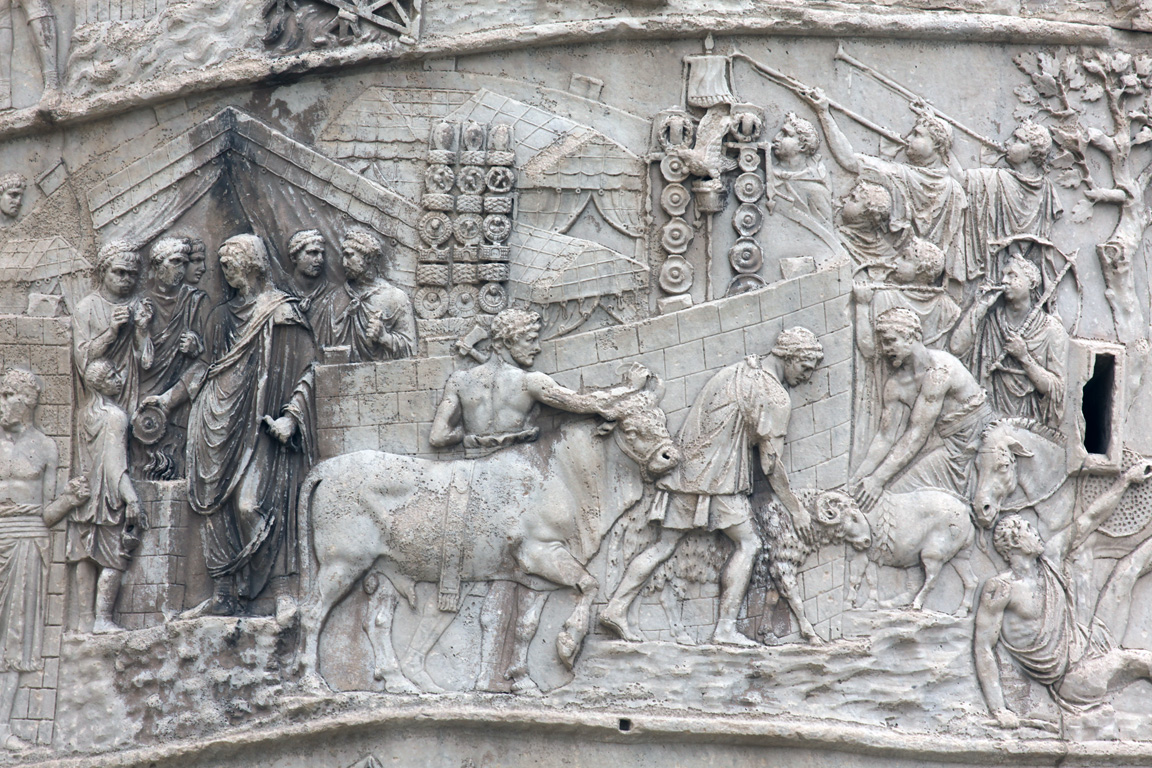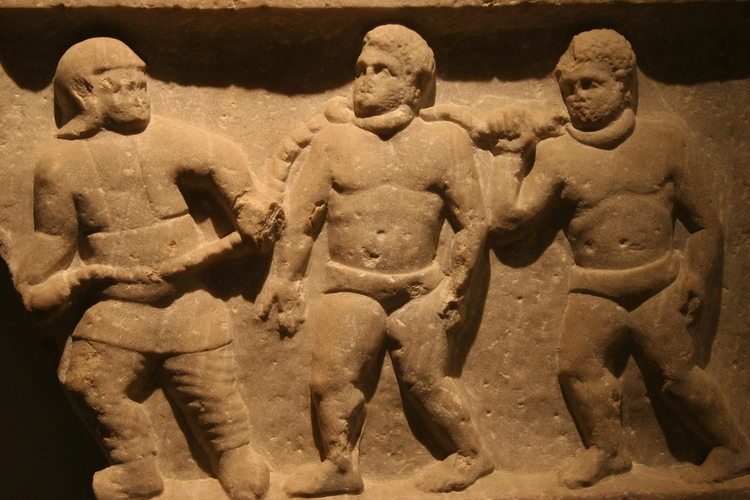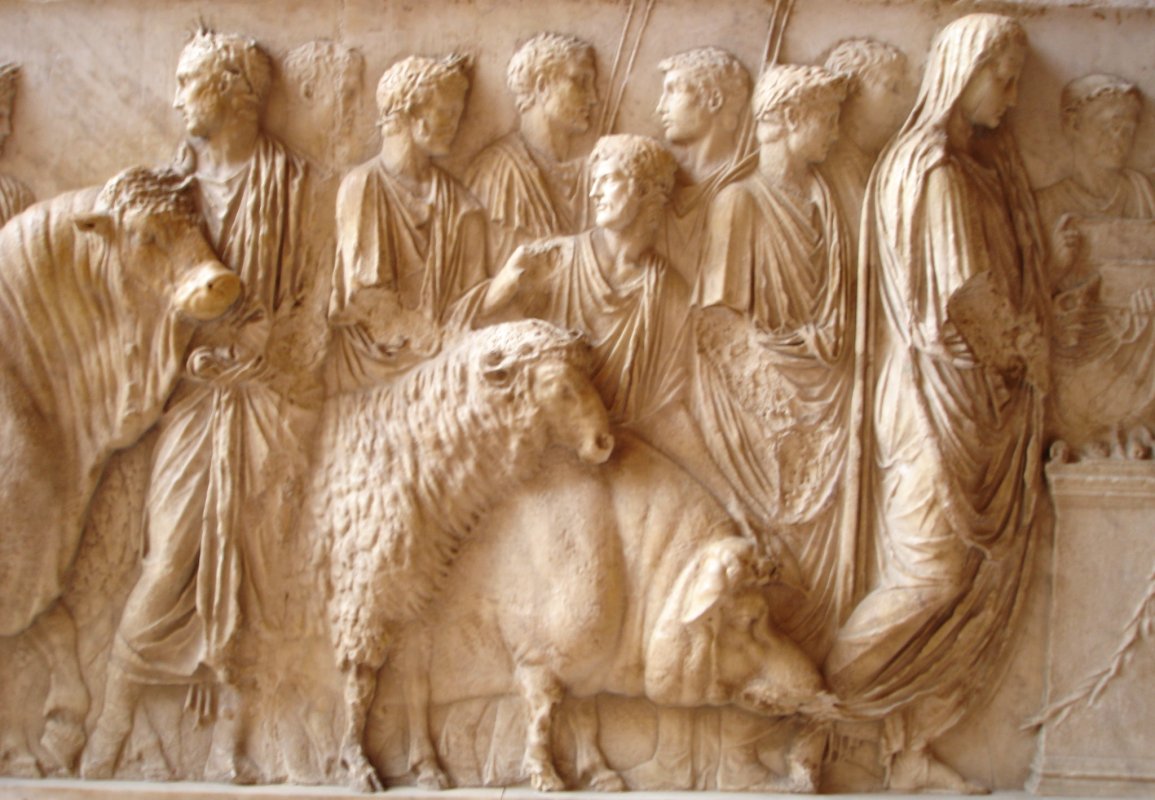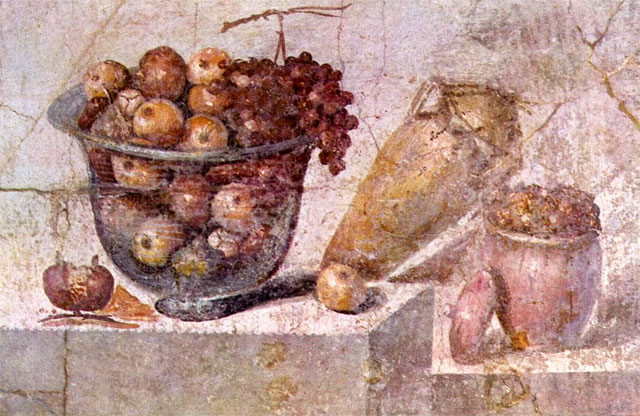CLAS 301B
January 30, 2025
Cato the Elder

(public) suovetaurilia scene (Column of Trajan, 113 CE)
2nd Century BCE Latin Literature: continuing influence of Greeks (slaves, teachers, tourists); libraries, writers & intellectuals; Latin poetry:
- comedy: creative period to end of 2nd century BCE (later revivals); Roman Comedy gives way to other dramatic forms (mime, pantomime) & popular entertainments (chariot racing, gladiators, etc.)
- parallel development of Roman tragedy after Greek models & Roman innovation of fabula praetexta ("toga-play", tragedy on Roman historical subject); fragmentary tragic remains until Seneca’s 8 surviving tragedies (1st century CE)
- epic: Ennius’ (239-169 BCE) Annales, Roman national epic until Vergil’s Aeneid in dactylic hexameters (fragments); also tragedy, satire, philosophical works, didactic poem on gastronomy
 1st century BCE Roman Portrait (gravitas)
1st century BCE Roman Portrait (gravitas)
Marcius Porcius Cato (catus, "the prudent"; 234-149 BCE): consul (195 BCE), censor (184 BCE; black marks for PDAs); arch-conservative champion of traditional Roman values against Hellenic influences (e.g. Greek philosophers expelled from Rome in 155 BCE) in Rome; fear of Carthage (promoted Third Punic War, 149-146 BCE & quasi-genocide); beginnings of Latin prose literature
- oratory (fragments): pragmatic approach vs. Greek rhetoric (rem tene, verba sequentur, “keep a grip on the subject, the words will follow”), but studied Greek & Greek orators
- Origines: first history of Rome in Latin (founding of Rome to Cato's time): fragments reflect Cato's moral & ideological concerns, promote Roman national identity & pride (e.g. names of Roman generals withheld)
- De Agri Cultura ("On Agriculture"): first surviving Latin prose text; ancient wisdom literature/didactic tradition (Greek poetry dating back to Hesiod, 8th century BCE); used Latin translation of Cathaginian Mago's farm manual
- practical farming instruction manual during transition from family farms to vast Italian estates (latifundia) utilizing vast slave labor (ca. 160 BCE); lacks literary embellishment, mythical or philosophical perspective on farming (cf. Hesiod)
- paterfamilias: world-view & reputation of Roman aristocratic patriarch reflected in vineyard estate
De Agri Cultura, Introduction (honor, morality & the landed aristocracy)
It is true that to obtain money by trade is sometimes more profitable, were it not so hazardous; and likewise money-lending, if it were as honorable. Our ancestors held this view and embodied it in their laws, which required that the thief be mulcted double and the usurer fourfold; how much less desirable a citizen they considered the usurer than the thief, one may judge from this. And when they would praise a worthy man their praise took this form: "good husbandman, good farmer"; one so praised was thought to have received the greatest commendation. The trader I consider to be an energetic man, and one bent on making money; but, as I said above, it is a dangerous career and one subject to disaster. On the other hand, it is from the farming class that the bravest men and the sturdiest soldiers come, their calling is most highly respected, their livelihood is most assured and is looked on with the least hostility, and those who are engaged in that pursuit are least inclined to be disaffected. And now, to come back to my subject, the above will serve as an introduction to what I have undertaken.
- Cato’s pragmatism: virtues of frugality, work (no "gadding about!" = ambulare, "walking around"); tradition & stability ("[the farm] should lie among those farms which do not often change owners", 1) > increase efficiency & productivity on villa (equipment, labor, rations)
De Agri Cultura 2 (instructions for the overseer = vilicus; cf. Olympio in Casina)
Give orders that whatever may be lacking for the current year be supplied; that what is superfluous be sold; that whatever work should be let out be let. Give directions as to what work you want done on the place, and what you want let out, and leave the directions in writing. Look over the livestock and hold a sale. Sell your oil, if the price is satisfactory, and sell the surplus of your wine and grain. Sell worn-out oxen, blemished cattle, blemished sheep, wool, hides, an old wagon, old tools, an old slave, a sickly slave, and whatever else is superfluous. The master should have the selling habit, not the buying habit.
cf. Varro, On Agriculture 1.17.1, slave as instrumentum vocale, "tool with a voice/talking tool"

Relief depicting a chained slave (Smyrna, ca. 200 CE)
- investment in workers ("human capital")
De Agri Cultura 54-59 (allotment of provisions)
There is nothing more profitable than to take good care of cattle [detailed feeding instructions] . . . Rations for the hands [grain, bread for "chain-gang", wine, olive relish, salt] . . . Clothing allowance for the hands: A tunic 3½ feet long and a blanket every other year. When you issue the tunic or the blanket, first take up the old one and have patchwork made of it. A stout pair of wooden shoes should be issued every other year.
- wisdom tradition (precepts & maxims), e.g. "Remember that a farm is like a man – however great the income, if there is extravagance but little is left" (1); "the forehead is better than the hindhead" (4), "if you are late in doing one thing you will be late in doing everything" (5)
- farming as religious act/ritual: De Agri Cultura (lit. "On the Cultivation of Land"; colo . . . cultum, "cultivate", "worship", "inhabit"; agricola & colonus, "farmer"); control of paterfamilas (respect to Lar(es) first duty when visiting, 2); scrupulous observance of religious holidays – farming a contract with the gods (sacrifice, magic)
- preserves ancient formula for cultivating wild grove: sacrifice of pig, "Whether you be god or goddess to whom this grove is dedicated . . . in offering this pig to thee I humbly beg that thou wilt be gracious and merciful to me, to my house and my household, and to my children"; additional sacrifice to till ground (+ daily ritual, "if you miss a day, or if public or domestic feast days intervene, a new offering must be made", 140)

Suovetaurila scene (Roman sarcophagus,
1st century CE)
- suovetaurilia (sus, ovis, taurus): ancient ritual of purifying & blessing (lustratio) private land (Ambarvalia festival, "circumambulation") – preserves carmen (cf. Mars/Marmar in hymn of Arval Brothers)
De Agri Cultura 141 (formula of suovetaurilia)
The following is the formula for purifying land: Bidding the suovetaurilia to be led around, use the words: "That with the good help of the gods success may crown our work, I bid thee, Manius [generic name – overseer?], to take care to purify my farm, my land, my ground with this suovetaurilia, in whatever part thou thinkest best for them to be driven or carried around." Make a prayer with wine to Janus and Jupiter, and say: "Father Mars, I pray and beseech thee that thou be gracious and merciful to me, my house, and my household; to which intent I have bidden this suovetaurilia to be led around my land, my ground, my farm; that thou keep away, ward off, and remove sickness, seen and unseen, barrenness and destruction, ruin and unseasonable influence; and that thou permit my harvests, my grain, my vineyards, and my plantations to flourish and to come to good issue, preserve in health my shepherds and my flocks, and give good health and strength to me, my house, and my household. To this intent, to the intent of purifying my farm, my land, my ground, and of making an expiation, as I have said, deign to accept the offering of these suckling victims; Father Mars, to the same intent deign to accept the offering of these suckling victims" . . . If favorable omens are not obtained in response to all, speak thus: "Father Mars, if aught hath not pleased thee in the offering of those sucklings, I make atonement with these victims." If there is doubt about one or two, use these words: "Father Mars, inasmuch as thou wast not pleased by the offering of that pig, I make atonement with this pig" [instauratio, "repetition of ritual"].
- De Agri Cultura 142-3: glimpses of the restricted life of the female housekeeper (vilica), subject to orders of dominus & domina – Lares (daily), domestic duties
- De Agri Cultura 156-7: the magic & omnipotence of medicinal CABBAGE ("surpasses all other vegetables") – laxative, hangover prevention, emetic, healing various ailments (sores, ulcers, arthritis, insomnia, deafness, etc.)!

Tuesday (2/4): Catullus & the Neoterics or Poetae Novi (“New Poets”)




